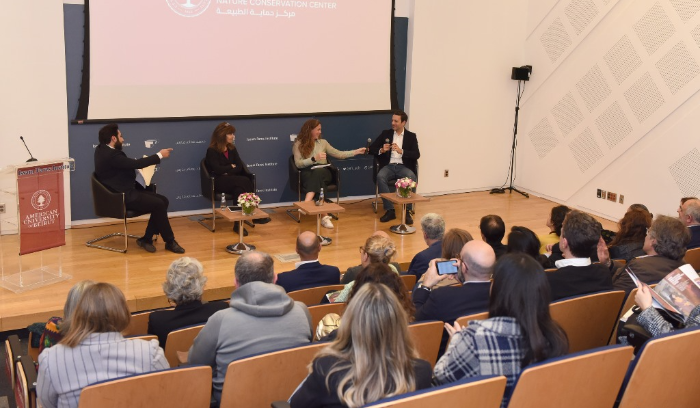NNA - The Environment and Sustainable Development Unit (ESDU) at the American University of Beirut (AUB) launched DAWWERA (Designing Alternatives for Water, Waste, and Energy in Rural Areas), an initiative that aims to empower stakeholders in the water-energy-waste-food nexus through integrating the circular economy approach that considers the linkages between these sectors, while capturing the social, economic, and environmental aspects.
The launch event took place this March at AUB, and was attended by the Lebanese Minister of Environment Nasser Yassine, British Ambassador to Lebanon Hamish Cowell, Interim Dean of the Faculty of Agricultural and Food Sciences at AUB Ammar Olabi, and ESDU Executive Director Shady Hamadeh, along with other municipal representatives.
Food security is becoming an increasingly alarming issue in Lebanon. It is entwined with other systems from which the water, waste, and energy sectors are overarching. Overlooking these interconnections when designing policies or strategies for intervention might lead to counteractive and unintended consequences. Therefore, adopting a holistic and integrated approach is crucial to capturing all social, economic, and environmental aspects.
“Through DAWWERA, the Environment and Sustainable Development Unit at AUB will work on enhancing and empowering small-scale food producers in the rural areas of Lebanon by integrating the circular economy into the food value chain and by using the water-waste-energy- food nexus approach,” said ESDU Executive Director Shady Hamadeh. He added that to do that, DAWWERA will employ an innovative method based on “systems thinking” to map out interconnections between the different sectors relevant to each intervention.
The activities and projects implemented under DAWWERA present sustainable and supportive interventions that aim at utilizing resources efficiently through the water-waste-energy-food nexus approach.
“There is a lot of funding for climate change projects and municipalities are the front liners in the environmental work,” commented Minister of Environment Nasser Yassine.
British Ambassador to Lebanon Hamish Cowell said, “We believe that the Lebanese civil society has an important role in accelerating climate actions by being agents of change, climate awareness activists, entrepreneurs, and innovators, and I think the DAWWERA initiative is one big example of these initiatives.”
The Environment and Sustainable Development Unit (ESDU) at AUB is already mapping out civil society organizations, community-based organizations, and municipal actors that are engaged or willing to engage in such activities and has already established partnerships and collaborations under DAWWERA. In addition, a steering committee was established and is leading DAWWERA’s plan of action. This committee is composed of several key players in the water-waste-energy-food nexus, including Recycle Lebanon, Berytech, the Norwegian Refugee Council, Difaf, Development for People and Nature Association, the Waste Management Coalition, the Millennium Institute, and Sustain the World.
As part of the DAWWERA pre-launch, four roundtable discussions took place to tackle each of the four previously mentioned sectors’ issues, solutions, and interlinkages. As a result, municipalities were found to be crucial implementing authorities. Consequently, ESDU Project Coordinator Christelle Bou Harb announced that ESDU, under the DAWWERA initiative, is launching the Waste-Water-Energy-Food (W2EF) municipal contest. The aim of this competition is to support municipalities who are promoting sustainable best practices using the nexus approach. Two applicants will be selected to win $4,000 each.
==============










